 There’s been discussion among my business-owning friends about what this year will bring. Entrepreneurs are concerned, and rightfully so. Only recently has it seemed like the folks in Washington are paying attention to small business owners. We’re told all the time how important we are, but actions speak louder than words. If you’re like me, you just want government to leave you alone and let you run your business the best way you can. That’s the foundation to the free enterprise system. However, I might make you mad at what I’m about to say.
There’s been discussion among my business-owning friends about what this year will bring. Entrepreneurs are concerned, and rightfully so. Only recently has it seemed like the folks in Washington are paying attention to small business owners. We’re told all the time how important we are, but actions speak louder than words. If you’re like me, you just want government to leave you alone and let you run your business the best way you can. That’s the foundation to the free enterprise system. However, I might make you mad at what I’m about to say.
Don’t feel sorry for yourself or complain; it doesn’t help. I feel all of us have an obligation to our families, our teams, our communities, our country and ourselves to do what we can right now to make our businesses better. You can’t just sit back and wait for the economy to get better, you – you – have to take some dramatic steps right now to improve your organizations and be ready for the recovery. In the next two years we’re going to see our businesses doing a lot better and smart owners are looking for ways to improve right now. Someone in Washington once said, “Never waste a big crisis.” I agree with that when it comes to business. You need to examine your business, or better yet have someone else look at your business and tell you what they think needs improvement.
I recently read a fascinating story in the The Wall Street Journal about Mary Ann Mauldwin, a 57-year-old former middle school teacher who Roush & Yates Racing Engines hired five years ago to help improve their NASCAR team. You’re probably wondering what the folks at Roush & Yates thought when they heard she was hired. What does a 50-something teacher know about NASCAR? I’ve been to several NASCAR races; they are an amazing lesson in branding, entertainment and business. Suffice to say, you don’t see too many 50-year-old-teacher-looking ladies at these races. But, the fact Mary didn’t know a whole lot about NASCAR was the reason Roush & Yates hired her.
Here are some of Mauldwin’s accomplishments:
- She implemented a new parts inventory control system that has been 100 percent accurate after five audits;
- She took what was a loser – old parts – and turned it into a lucrative profit center selling refurbished parts to other race teams and fans; and
- She teaches operations management to 100 employees.
I know many landscapers are NASCAR fans; I am. The sport is fascinating. I have learned a lot from watching them in action. It seems to me that NASCAR, maybe more than most other sports, seems to have a holistic approach to the sport. They just want to win and will employ whatever tactic they can to get better – even bringing in former teachers who don’t know the difference between “a piston and a connecting rod,” as Mauldwin said in the article.
It is a lesson that another set of eyes on your business is always good. Sometimes those of us with all the experience can’t see what’s possible. We’ve become conditioned to our environments and need some outside help. Instead, what we need to focus on is getting better. The more efficiently we can operate, the more profits we can put in our back pockets. Every angle you can pick up is another penny in the profit column.
This month, find someone from a different line of work to look at your business. Maybe you could talk to your local university’s engineering department and ask someone to look at your operation and make suggestions to improve your processes. Maybe you could ask a local successful warehousing company to send their best warehouse person to your shop and consult with you on how your space could be better utilized. Maybe you could ask your team for help.
It all boils down to wanting to get better and then not letting your ego get in the way. No one likes to be told they’re not good at something; I know that. But if the truth helps, shouldn’t you listen?
Get curated news on YOUR industry.
Enter your email to receive our newsletters.
Explore the March 2010 Issue
Check out more from this issue and find your next story to read.
Latest from Lawn & Landscape
- Sgro named Yanmar Compact Equipment's North American president
- Aphix acquires Curb Appeal Landscaping in Birmingham
- Project EverGreen helps revitalize Milan Park in Detroit
- Trex Company wins Product of the Year, Judges’ Choice Winner at Environment+Energy Leader Awards
- General Equipment & Supplies in Fargo adds Takeuchi equipment
- Mariani Premier Group acquires Hazeltine Nurseries
- EnP Investments adds Mark McCarel as Northeast territory sales manager
- Our April issue is now live





